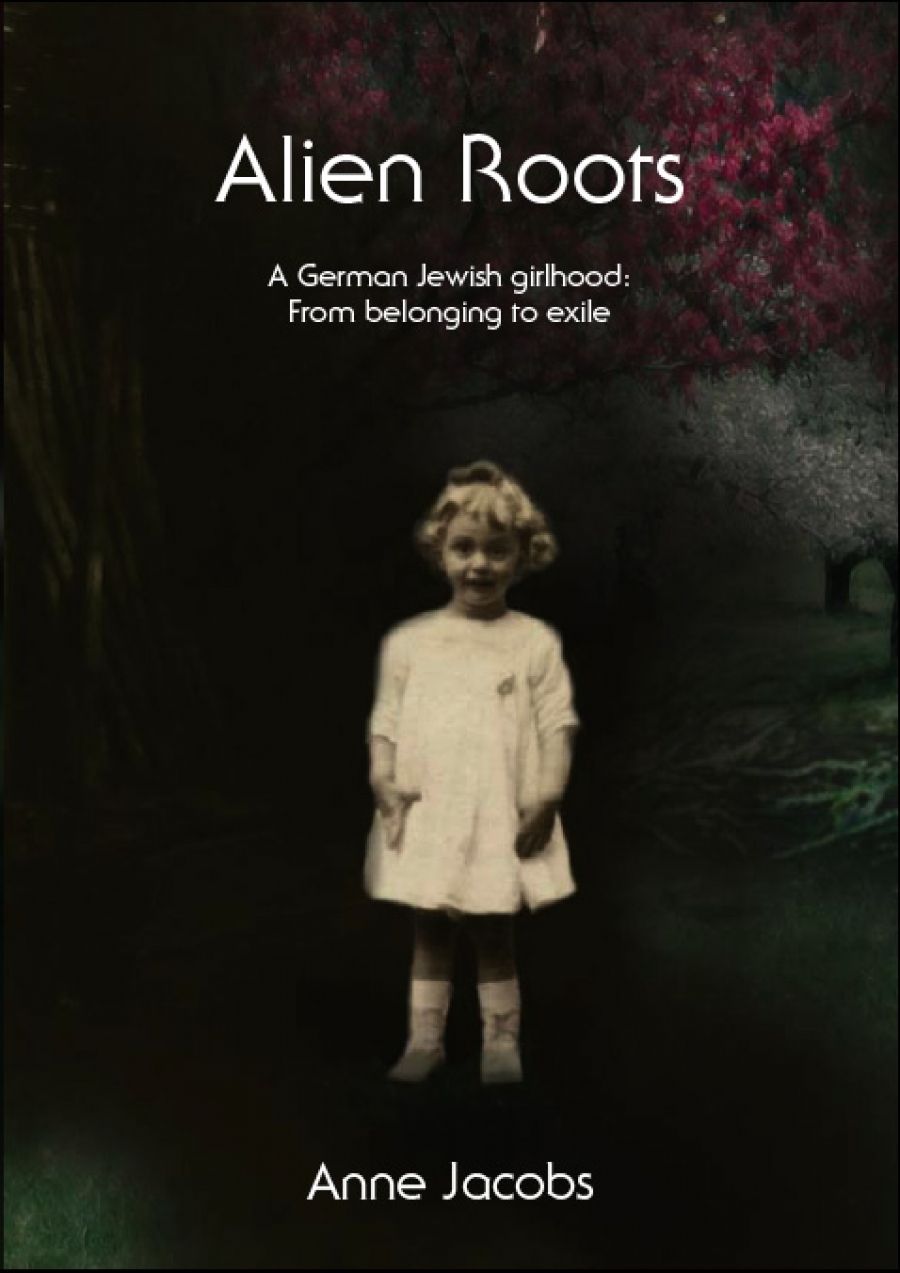
- Free Article: No
- Contents Category: Memoir
- Review Article: Yes
- Article Title: A Wider Eye
- Online Only: No
- Custom Highlight Text:
Alien Roots is a remarkable memoir of pre-war Germany, written in Melbourne by Anne Jacobs (born Annemarie Meyer). Jacobs wrote it in the 1960s, at a time when the Holocaust was rarely mentioned in Australia. Charles Jacobs collated his wife’s memoir for the family, and her children arranged for its publication in late 2006, twenty-four years after her death. The Melbourne-based Makor Jewish Community Library is the publisher.
- Book 1 Title: Alien Roots
- Book 1 Subtitle: A German Jewish girlhood: from belonging to exile
- Book 1 Biblio: Makor Jewish Community Library, $29.95 pb, 411 pp
The memoir is notable for its wealth of detail. The author is able to recall the precise events and characters in her early life as a schoolgirl in the late 1920s and 1930s. She evokes a vivid picture of Germany between the wars, struggling to survive under the shadow of the Treaty of Versailles. Writing from the point of view of a young Jew in an assimilated Hannover family, Jacobs describes the slow but relentless changing of attitudes towards Jews in those times. She succeeds in recapturing the feeling she had as a child of being immune to Nazi racism, not only because her family were non-practising Jews, but also because, like most Jewish German families, they had become fully integrated into German society over several generations.
At the same time as recalling this child’s point of view, Jacobs uses the benefit of hindsight to give us a clear historical perspective on the rise of the Nazi party, the reasons for its popularity and its acceptance by the majority of Germans. Alien Roots follows the story of how Jacobs grew to maturity in an increasingly alienating environment. Through the story of this one woman, we read the wider story of the Jewish race in Germany in the lead-up to World War II.
This memoir gives more than an insight into pre-war Germany. There are memories of schools that she attended in England and Belgium which help flesh out a broader picture of events in Europe. Jacobs’s mother sent her to England to be educated in a progressive co-educational boarding school that encouraged independent thought, a move that was anathema to Jacobs, who had been brought up in a disciplined German Gymnasium where children were not encouraged to discuss adult issues such as religion and politics. In contrast, her subsequent schooling at a Catholic convent in Belgium, with its strict but protective cloistered existence, was welcomed by Jacobs, especially as the world outside was becoming an increasingly threatening place.
The most poignant moment in the memoir, one that acts as a turning point in the story, is her return to Germany after a homesick year in England, only to find that her idyllic German childhood is a thing of the past and that her schoolgirl friendships are over. In spite of her efforts and those of her close friends, nothing will ever be the same again for Jews in Germany. Her friends have become part of the new German youth. The changes that take place in these childhood friendships illuminate the changing allegiances that were taking place in the adult world.
Alien Roots is written without any literary pretension, in clear precise prose. Jacobs’s command of the English language, in spite of the fact that it was not her native tongue, is excellent. This, her only long work, has a fine sense of rhythm. The 400 pages are easy to read. The writer has a distinctive voice, depicting every character in her family with sympathy but objectivity, including her own personality as a child, stubborn and quick to anger. She writes with a sharp sense of humour, a retrospective irony, a lightness of touch and no trace of self-pity. The most harrowing events are told in a single sentence, all the more searing because of their brevity.
On a personal level, Alien Roots was without doubt a way for Jacobs to capture all that was precious to her as a child growing up in Germany: the Eilenriede wood in the heart of Hanover; the magical Christmases that her assimilated Jewish family enjoyed; the huge and enchanting house and garden of her paternal grandmother. These were all lost to her when the Nazis came to power. She conveys her love of Germany; her early and deeply felt nationalistic feelings during group outings to the countryside; her participation in the harsh, brooding nature mystique that was unique to Germany and that found expression in folk singing, camping, hiking and rural films. This belief in the sacredness of German soil gave Hitler an easy ride to power. It was a faith that Jacobs shared until she started to identify consciously with her Jewish roots and became one of the dispossessed.
Jacobs emigrated to Australia in 1940, thanks to the fact that her grandmother had been born in Australia. She married and lived in Melbourne with her husband and children, but this part of her life is not touched on in Alien Roots, which ends as she leaves Germany for England at the end of 1937, aged nineteen. This is more than a personal memoir. Jacobs’s priority was to convey her insights into those pivotal years in Jewish and German history. She could contemplate the pre-war years from a distance and record an experience of fascism that illuminates the predicament of German Jews before the Holocaust.


Comments powered by CComment